Can You Drink Too Much Diet Green Tea

Are you new to the matcha green tea craze or looking to boost your matcha knowledge and options? Matcha powders and tea kits are popping up everywhere in cafes and coffee shops near you — but this earthy green tea is much more than a casual indulgence. It's also an incredibly versatile ingredient for any time of the day that offers a broad variety of health benefits. Here's what you need to know about matcha, including why it's good for you and how it can help you get your day off to a healthy beginning.
"Matcha" loosely translates to "fine powder tea" or "ground tea." Matcha is produced from green tea plants grown specifically for the purpose of being ground. Leaves of the tea plant that matcha comes from, Camellia sinensis, are shaded with special structures and cloths for the final three or four weeks before their harvest. Shading the plants this way is said to increase their production of caffeine and the amino acid theanine. Before being dried and stone-ground into a fine powder, the leaves are stripped of all stems and veins, steamed to halt any fermenting, and dried and aged in cold storage.
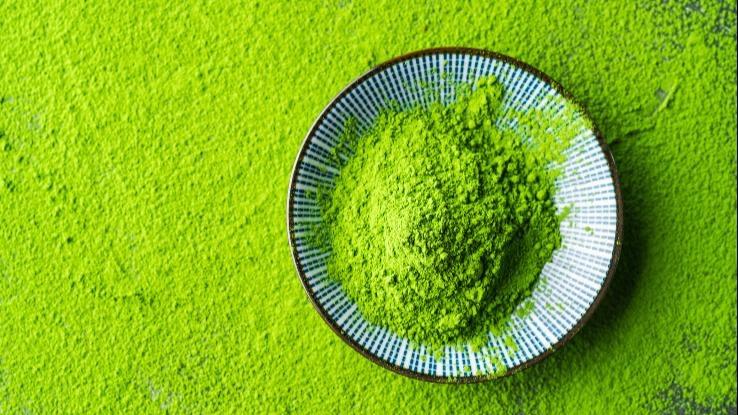
Green tea — in matcha form or otherwise — isn't a significant source of our daily required vitamins and minerals, but it has many other reported health benefits thanks to its high concentration of plant compounds called polyphenols. Polyphenols are micronutrients found in plant-based foods that are typically loaded with antioxidant properties. A study published in the journal Food found that matcha has high antioxidant potential thanks to its polyphenol compounds carotene and tocopherol, both of which can prevent cells from incurring damage. The polyphenols in matcha tea may also improve mood, performance, relaxation and energy (yes, all at once).
What else do studies say about the health benefits of matcha? Consuming the amino acid L-theanine that's present in matcha may boost cognition and selective attention, especially when combined with caffeine. Another antioxidant, epigallocatechin gallate (EGCg), that's in matcha may play a role in preventing the growth of cancer (in animal- and test tube-based studies). In addition, studies based on humans have found that drinking green tea may prevent the development of some cancers by protecting cells from DNA damage. Studies have also found a link between a reduced risk of heart disease, reductions in risk factors for diabetes and even relief from the symptoms of some types of vision impairment.
Easy Blender Matcha
Here's an easy, creamy and classic way to start your morning with all the benefits of matcha — one that's vegan, gluten-free, nut-free, oil-free, refined sugar-free and soy-free. This warm alternative to morning coffee dreamed up by the wellness-conscious leader of nutrition site Oh She Glows is made from water, canned coconut milk, matcha powder and maple syrup. The maple syrup is optional, of course, but it's a great option if you prefer your morning pick-me-ups with a bit of sweetness.
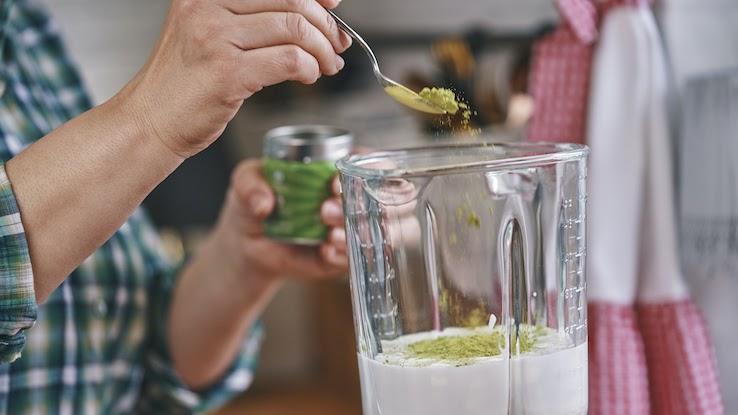
After brewing your matcha in hot water, you'll add it to your blender to froth it up, giving it a bit of the same texture as a regular latte — and making it a great replacement for one. After about 20 seconds of pulsing and a pour into your favorite mug, your day will be off to a healthy start.
Zesty, Fruity Cold Brew
When you think of cold brew, coffee is most likely what comes to mind. This recipe from Life Is Better With Tea is an alternative that'll get you thinking differently if you want to start your day with a matcha beverage that's instant and cold. With just three ingredients and in just two minutes, it'll give you a refreshing start to your day.
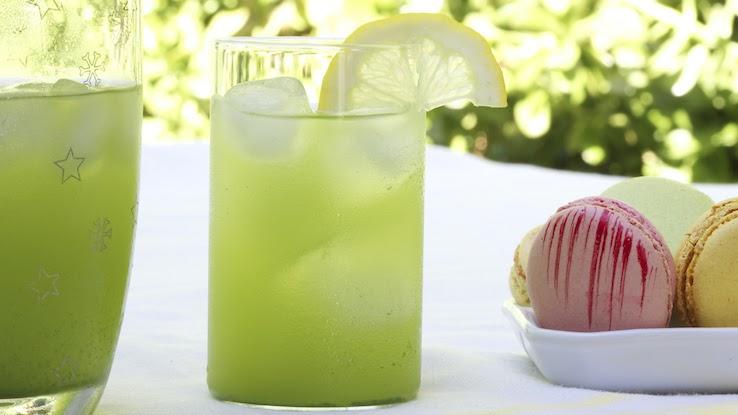
Simply filter matcha powder through a fine mesh sieve into a drinking glass and add sparkling water, like Perrier or Pellegrino. If you're a traditionalist, whisk that concoction with your bamboo matcha whisk or, if you're a modernist, use an electric frother. Once it's foamy, add some fresh orange juice. It's slightly sweet and definitely fruity. And it's sure to invigorate your morning.
Lots-of-Energy Latte
You could easily make your morning latte with coffee — but you might not want to once you discover this matcha alternative that provides plenty of caffeine all on its own. Matcha delivers a lot more caffeine than you think, but thanks to the L-theanine present in the tea, you'll get sustained, calm energy without the same spikes and crashes that coffee often causes.
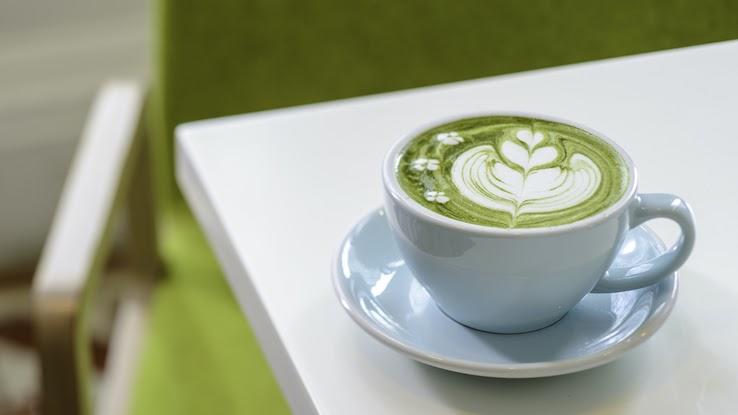
To make an easy matcha latte, try out this recipe from Nourished Kitchen. You'll only need to froth up some (preferably whole) milk with some matcha powder sprinkled in. When it's ready, the milk is warm and your matcha is completely dissolved. You can boost the nutrition of this matcha latte by adding in some collagen peptides, honey, spirulina or vanilla bean powder. You can also swap out the whole milk for coconut milk for a dairy-free version that still provides an energizing start to your day.
Smooth and Rich Blended Matcha
If you prefer something a bit heartier in the morning, smoothies are an ideal option. There are countless combinations that might hit the spot, but for a great matcha jumping-off point, you'll want to try this recipe from Breakfast Criminals. It's full of smooth and creamy ingredients — think banana, avocado, coconut water and matcha. You'll only need to place all your ingredients in a blender and puree them up before you start sipping this easy breakfast.
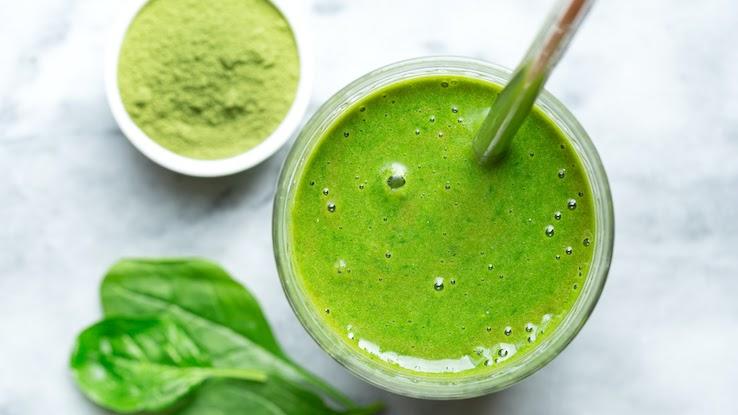
Note that this recipe calls for coconut water, the actual "juice" inside a coconut, rather than coconut milk. If you don't happen to have a frozen banana on hand either, no worries. Use a fresh one and add a few cubes of ice to the blender to get that perfect smoothie consistency.
A Slightly Spicier Sip
So many of the breakfast beverage options using matcha tend toward the fresh and zingy end of the spectrum — mint leaves, anyone? If your taste buds prefer flavors that lean more towards the home-baking end of the spectrum — nuts and cinnamon, for example — there are matcha alternatives for you, too.
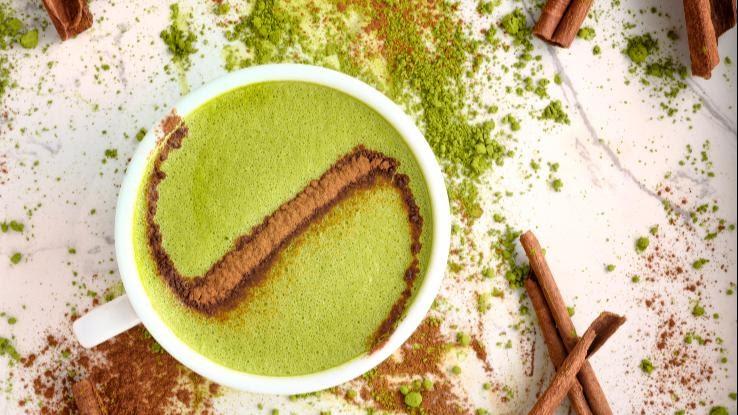
This vegan matcha latte from Flora & Vino is very different from the latte option above, but it really shows the diversity matcha brings to the table. To make it, you'll only need to whisk the matcha powder in hot water before adding some steamed almond milk. Don't forget to sprinkle your cup with cinnamon. You can tweak this homespun take on a matcha latte by substituting cashew or hazelnut milk for the almond milk, and by swapping in another spice — perhaps nutmeg — for the cinnamon.
Resource Links:
https://www.ncbi.nlm.nih.gov/pmc/articles/PMC7231151/
https://pubmed.ncbi.nlm.nih.gov/28056735/
https://pubmed.ncbi.nlm.nih.gov/30783194/
https://pubmed.ncbi.nlm.nih.gov/26869148/
https://www.ncbi.nlm.nih.gov/pmc/articles/PMC4829846/
https://www.ncbi.nlm.nih.gov/pmc/articles/PMC5824026/
https://www.cancer.gov/about-cancer/causes-prevention/risk/diet/tea-fact-sheet
https://www.aicr.org/resources/blog/can-green-tea-help-lower-blood-sugar-new-study/
MORE FROM SYMPTOMFIND.COM
Can You Drink Too Much Diet Green Tea
Source: https://www.symptomfind.com/health/morning-matcha-green-tea-drinks?utm_content=params%3Ao%3D740013%26ad%3DdirN%26qo%3DserpIndex